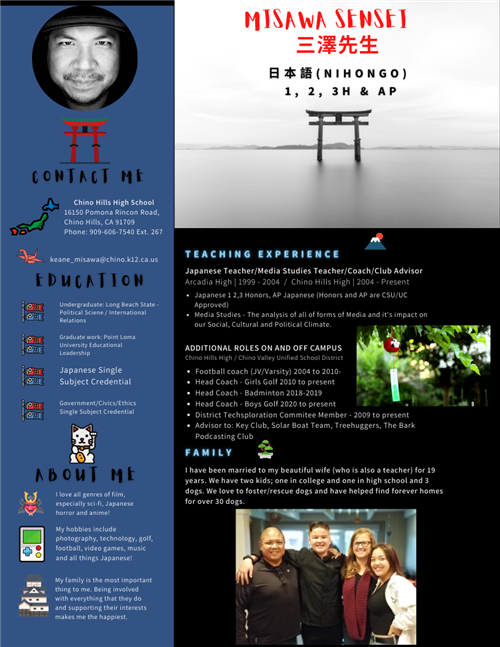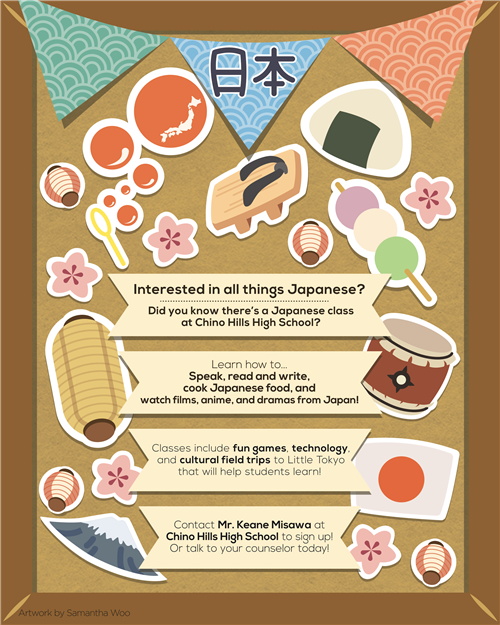Misawa, Keane
Page Navigation
- Chino Hills Japanese Program
- Misawa Sensei - Japanese Classroom
- Classroom Drills and Resources - Mandatory
- Japanese 1
- Japanese 2
- Japanese 3 Honors (CSU/UC Approved Course)
- AP Japanese - UC/CSU Approved Course
- Chino Hills High School - Varsity and JV Girls Golf
- Career Pathways and Job Openings using Japanese
- Maps to local Japanese hotspots in the Los Angeles area.
- Photo Gallery: All things Japanese!
- A Snapshot of Life in Japan - Multimedia Files
-


 Courtesy of Guy and Road.
Courtesy of Guy and Road.What will you get out of taking Japanese at Chino Hills High School?
Click to find out!
Creating Bridges everyday.

Created in 2016
-
JLPT certificates offer various advantages, ranging from recognition as academic credit and graduation certification at schools to preferential treatment at companies and acknowledgement of qualification in society.
Advantages in Japan
Earn points for preferential treatment for immigration to Japan
Those who pass JLPT N1 receive 15 points under the government's "Point-based Preferential Immigration Treatment System for Highly Skilled Foreign Professionals." Individuals with a total of 70 points or higher receive preferential treatment at immigration.
For more details, please refer to the website of Immigration Bureau of Japan.
One of requirements to take Japan's national exams for medical practitioners
A JLPT N1 certificate is required for medical practitioners licensed overseas who want to take Japan's national exams for medical practitioners, and other professions.*
For more details on application requirements for national exams for medical practitioners, please refer to the Ministry of Health, Labour and Welfare website (Japanese).*Other national exams that require a JLPT N1 certificate as part of application:
Dentist, nurse, pharmacist, public health nurse, midwife, radiology technologist, dental hygienist, dental technician, clinical laboratory technician, physical therapist, occupational therapist, orthoptist, clinical engineer, prosthetist, emergency medical technician, speech therapist, veterinarianOne of requirements to take Japan's prefectural exams for assistant nurses
A JLPT N1 certificate is required for overseas nursing school graduates who want to take Japan's assistant nurse exams.
Exams for assistant nurses are administered by each prefecture. For more details, please contact the prefecture of interest.A test subject is waved on accreditation exam for completion of junior high school level education in Japan
The Japanese-language test is waved for examinees of foreign citizenship who pass JLPT N1 or N2.
For more details, please refer to the Ministry of Education, Culture, Sports, Science and Technology website (Japanese).One of requirements for Vietnamese nurse/care worker candidates under EPA
A JLPT N3 or higher certificate is required for Vietnamese nurse and care worker candidates who visit Japan as part of the Economic Partnership Agreement (EPA) between Japan and Vietnam.
For more details, please refer to the Ministry of Health, Labour and Welfare website (Japanese). -
Learning a Foreign Language
Listening
Listen carefully to your teacher and to others who are fluent in the language who speak at different speeds and with different accents. Tune in to foreign TV and radio programs whenever possible, and use recorded material such as DVDs and CDs. Even better, try to attend undubbed foreign films in commercial theaters. A school's language laboratory will also provide aural training, and should be used regularly.
Speaking
Many students feel natural inhibitions and hesitations in speaking, but try not to worry about how others may perceive you if you make a mistake. It is only with continued practice that you will begin to speak with facility. Therefore, participate in debates, discussions, dialogues, and skits as much as you can. In addition, practice in a language laboratory gives you the opportunity to compare your speech with that of a model speaker.
The importance of thorough preparation for the speaking part of the exam should not be underestimated. You need to be familiar with the operation of recording equipment, and to practice recording your answers to questions. Ask your teacher or AP Coordinator to provide at least one trial run of the examination recording equipment and procedures before the actual test administration.
Reading
You should read a wide variety of materials, such as literary prose, essays, poems, dramatic works, dialogues, cartoons, advertisements, book reviews, and journalistic material, including editorials. For the literature course, be sure to read and study all the works on the required reading list.
When you read, look out for the grammatical cues of the text, such as verb tenses, and pay attention to factual information in the text (understanding who, what, when, where, why, and how). For the literature course, practice doing a close reading of selected passages for linguistic as well as stylistic analyses, such as recognition of register, tone, humor, irony, and narrative techniques.
Writing
Of all the language skills, writing is considered by many teachers and students to be the most sophisticated. Unlike listening and speaking—which may be facilitated by having another person present—writing is usually practiced alone on subjects you have already discussed, heard, or read about. Because writing can be revised numerous times—and therefore progressively improved—in your classroom writing you may be expected to exercise greater accuracy, precision, and clarity than in oral performance.
General Tips for Exam Day
Pay close attention to accuracy. You will be penalized for incorrect spelling on the fill-in questions.
When composing an essay, organize your thoughts and make a brief outline first. (Organizational notes will not be scored.) The final essay should have a clear focus, logical development, appropriate details, and supporting materials that reinforce and enhance the ideas in the essay.
When recording answers in the speaking section, speak as extensively and appropriately as you can within the allotted time.
If you are asked to give an account of a picture sequence, remember that there is no single correct interpretation. Any recounting of the story is acceptable as long as it is relevant. If you don't know specific vocabulary, try circumlocution to explain what you mean.
-
All students will be utilizing technology in the classroom in the form of email, shared online documents (google docs, Office 365), cell phones, tablets, applications, etc. If you do not have access to a cell phone or laptop, please notify our school site immediately so that they can make accommodations to loan out technology.
-
Meguro Language Center - Tokyo
Main site for studying conversations, audio files, etc. This has 1000's of free and downloadable resources!
Once you click on the page, scroll down to see all of your free study materials, including study guides for the Japanese Language Proficiency Test!!
-
Chino Hills High School Japanese Language and Culture - Facebook page
Find interesting recipes, travel destinations, language learners corner and current events! Please like and SHARE!
-
Japanese Language Proficiency Test - Checklist.
Any Foreign Language Learner should as the question: What am I able to do?All Japanese Learners will benefit from this checklist when taking the appropriate exam from the Japanese Language Proficiency Test. Levels of difficulty: N1 --> N5 (N5 being the easiest)
There are no upcoming events to display.

 CVUSD HOME
CVUSD HOME